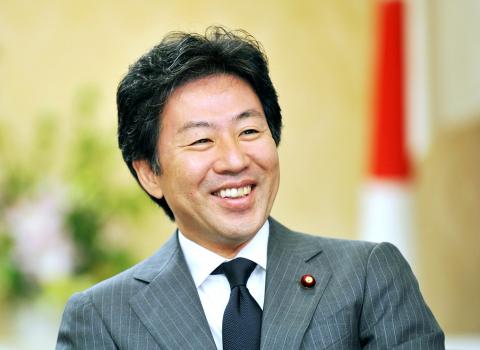Japanese Finance Minister Jun Azumi said recent yen movements have been abrupt and have strayed from economic fundamentals, a sign he shares his predecessor’s concern about a currency trading near a postwar high.
“There’s no doubt that the recent strengthening of the yen has been abrupt and that Japan’s economy is in a very severe situation,” Azumi said in an interview with a group of reporters in Tokyo yesterday after being sworn in last week. “I will keep an eye on speculative movements with great interest.”
Azumi is charged with ensuring the currency’s climb against the US dollar does not derail the nation’s recovery from March’s record earthquake. His predecessor, Yoshihiko Noda, who is now prime minister, oversaw three rounds of yen sales to counter the currency’s appreciation — intervention that failed to prevent the yen from reaching a record ¥75.95 per US dollar last month.

Photo: Bloomberg
Noda, who became prime minister last week, ordered ministers to compile measures to alleviate the impact of the strong yen on companies and households. Azumi was asked to lead efforts to compile the third extra budget after the former prime minister Naoto Kan introduced two packages to endorse ¥6 trillion (US$78.2 billion) spending for relief efforts and reconstruction.
Azumi, the nation’s eighth finance minister in three years, said companies are having trouble -coping with the stronger yen.
He also said he wants the Bank of Japan to take appropriate policies when necessary, adding that that they have been doing a “fine job” so far.
The yen traded at ¥76.83 per US dollar at 4:21pm yesterday in Tokyo. It has appreciated more than 4 percent in the past three months.
Apart from the already earmarked expenditure, the government estimated it will need to invest ¥13 trillion for reconstruction in five years. Additional spending may compound the nation’s debt woes.
Moody’s Investors Service lowered the nation’s sovereign-credit rating last month on concern that the government will fail to rein in its debt load, the largest in the industrialized world.
Azumi said on Sunday that he wants to express concern about the yen hurting Japan’s recovery from the quake when he meets his G7 counterparts for the first time at a gathering this week in France.
Meanwhile, Moody’s said Japanese securities firms face a negative outlook for at least another year as the sluggish economy, overseas expansion costs and global market uncertainty weigh on results.
“The operating performance of Japan’s securities firms will continue to be weak and volatile over the next 12 to 18 months,” Moody’s wrote in a report yesterday, maintaining its negative outlook on the Japanese securities industry.
“Cost cutting alone may not be sufficient to secure profitability,” it said.
Nomura Holdings Inc, Japan’s biggest brokerage, and closest rival Daiwa Securities Group Inc are among firms that are planning to trim costs that have swelled since they began expanding abroad. The two companies’ overseas units posted their biggest pretax loss in at least five quarters in the three months ended June 30.
“Although profit growth potential in Asia will be significant over the medium term, Moody’s has doubts about the ability of these firms to establish solid franchises that will generate stable and meaningful revenues,” the report said.

Quanta Computer Inc (廣達) chairman Barry Lam (林百里) is expected to share his views about the artificial intelligence (AI) industry’s prospects during his speech at the company’s 37th anniversary ceremony, as AI servers have become a new growth engine for the equipment manufacturing service provider. Lam’s speech is much anticipated, as Quanta has risen as one of the world’s major AI server suppliers. The company reported a 30 percent year-on-year growth in consolidated revenue to NT$1.41 trillion (US$43.35 billion) last year, thanks to fast-growing demand for servers, especially those with AI capabilities. The company told investors in November last year that

United Microelectronics Corp (UMC, 聯電) forecast that its wafer shipments this quarter would grow up to 7 percent sequentially and the factory utilization rate would rise to 75 percent, indicating that customers did not alter their ordering behavior due to the US President Donald Trump’s capricious US tariff policies. However, the uncertainty about US tariffs has weighed on the chipmaker’s business visibility for the second half of this year, UMC chief financial officer Liu Chi-tung (劉啟東) said at an online earnings conference yesterday. “Although the escalating trade tensions and global tariff policies have increased uncertainty in the semiconductor industry, we have not

Intel Corp has named Tasha Chuang (莊蓓瑜) to lead Intel Taiwan in a bid to reinforce relations between the company and its Taiwanese partners. The appointment of Chuang as general manager for Intel Taiwan takes effect on Thursday, the firm said in a statement yesterday. Chuang is to lead her team in Taiwan to pursue product development and sales growth in an effort to reinforce the company’s ties with its partners and clients, Intel said. Chuang was previously in charge of managing Intel’s ties with leading Taiwanese PC brand Asustek Computer Inc (華碩), which included helping Asustek strengthen its global businesses, the company

Power supply and electronic components maker Delta Electronics Inc (台達電) yesterday said it plans to ship its new 1 megawatt charging systems for electric trucks and buses in the first half of next year at the earliest. The new charging piles, which deliver up to 1 megawatt of charging power, are designed for heavy-duty electric vehicles, and support a maximum current of 1,500 amperes and output of 1,250 volts, Delta said in a news release. “If everything goes smoothly, we could begin shipping those new charging systems as early as in the first half of next year,” a company official said. The new